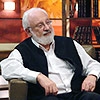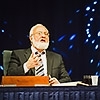Audio Version Of The Blog – 9/26/20
Listen to an Audio Version of the Blog
Download:MP3 Audio

Listen to an Audio Version of the Blog
Download:MP3 Audio
 Question: They say that the most complex decisions are made by a person intuitively and only simple decisions are made consciously and logically. What is intuitive decision making?
Question: They say that the most complex decisions are made by a person intuitively and only simple decisions are made consciously and logically. What is intuitive decision making?
Answer: I don’t know if it is worth talking about this topic at all. There is no need to drive yourself into some semi-gloomy state when the irrational part of the brain acts.
Question: Don’t you make decisions intuitively?
Answer: Never. I am a very simple, mechanical person, and I always choose solutions based on what can be learned from wise ancient books.
Question: So, you don’t listen to your inner voice when making decisions?
Answer: No. How can I trust some inner voice, some subconsciousness in myself? No way.
I usually get up at one o’clock in the morning, long before the lesson I give at three o’clock in the morning, and I think about solving a certain problem. I do not rely on intuition, but I try to enter into its solution the way that our ancient teachers advise.
[270767]
From KabTV’s “Management Skills” 6/11/20
Related Material:
Where To Look For The Right Solution?
All Our Decisions Stem From The Ultimate Goal
Preparing For The Great Assembly
 Question: Labor and work are two different concepts. Through labor people build relationships with each other. Work is a physical concept. It can be performed by humans, machines, and animals. Do you agree with this statement?
Question: Labor and work are two different concepts. Through labor people build relationships with each other. Work is a physical concept. It can be performed by humans, machines, and animals. Do you agree with this statement?
Answer: In my Kabbalah studies, I divide my labor, work, into corporeal and spiritual. We must devote necessary efforts to corporeal work in order for our animal part to exist.
And in order for our spiritual part to exist, we must come to understand our special mission, the special work of man in our world. It is work on unification, i.e., on annulling the ego, on developing an altruistic person who is connected to everyone and who reveals a completely new life in this connection.
Remark: The goal of labor: it is the final result of man’s creative activity.
My Comment: This is true for both corporeal and spiritual work.
Question: In your lectures, you say that building relationships between people is also difficult. What will be the product of such labor?
Answer: A properly organized society. This is the most important product.
We will be bound by the mutual agreement that our unification is the most important in life. From our connection, we will begin to comprehend the higher forces of nature. At the same time, evolution will be directed toward the psychological development of a person.
[270826]
From KabTV’s “The Post-coronavirus Era” 6/4/20
Related Material:
What Will 70% Of The World Population Study?
Professions Of The Future
The Most Needed Profession
 Question: How do intergenerational conflicts affect the entire system in a global, interconnected world? Will this difference increase or decrease?
Question: How do intergenerational conflicts affect the entire system in a global, interconnected world? Will this difference increase or decrease?
Answer: The difference will grow depending on how generations solve problems of interaction between themselves and within themselves. In this state, they will affect the overall picture of nature, which, in turn, will affect them.
I hope that at the same time, the intelligence of humanity will grow and thus compensate for the contradictions between generations.
[270380]
From KabTV’s “The Post-Coronavirus Era” 5/21/20
Related Material:
The Essence Of Generational Conflicts
How Do Generations Differ From Each Other?
Generation Gap, Part 1
 Religion Is a Factor Dividing Society
Religion Is a Factor Dividing Society
Question: A hundred years after the resettlement of German Jews to America, Russian Jews began to arrive.
According to the American writer Stephen Birmingham, German Jews were already respectable, well-dressed, bourgeois-looking and wealthy, and the new immigrants from Eastern Europe were ragged, impoverished, actively bearing the charge of their culture, fierce suffering, and pogroms. They were idealistic socialists.
German Jews were very much afraid of the Russians, especially their idea of organizing trade unions. Therefore, disagreements arose between them, but not on religious, rather on social grounds.
The famous American actor Kirk Douglas who comes from a family of Belarusian Jews noted that anti-Semitism was sometimes most strong among Jews, particularly with German Jews hating Russian and Polish Jews.
Why is the discord between Jews not only on religious but also on social grounds?
Answer: Our religion does not unite Jews. On the contrary, it makes everyone an individualist because it is not built on the true foundation of Judaism, which says “love your neighbor as yourself,” above all differences.
Religion believes that a Jew must fulfill everything that is said in the “Shulchan Aruch” (Code of Laws), and by this he will ensure his future in this and the next world. All the rest does not matter.
Question: Can’t external traditions unite people?
Answer: External traditions divide.
Question: Why is there the strongest anti-Semitism among Jews?
Answer: A Jew is a person who must show the whole world the way to unity, to “love your neighbor as yourself,” to rise above all the differences that love covers. We must be a light for the peoples of the world. And if we do not bear this, then we are in disunity and everyone hates us.
And where do we get the right message if we do not receive the appropriate education? Religion says nothing about it. On the contrary, it pits us against each other: these are Sephardim, these are black, these are white, these are Eastern, and these are Western, and so on. Everything is built on bringing maximum disunity into society.
To this day, we see this among Orthodox Jews. The more Orthodox a Jew is, the more he is attached to his narrow clan, to the extent that marrying others is a big problem. Only in recent years, somewhere, somehow, this has softened, but still not in strictly Orthodox communities.
At the same time, the non-religious part of society in Israel, and even in America, is absolutely indifferent to various parts of society and is ready to unite with them.
This clearly shows how much religion divides society into classes and groups, and how a departure from religion attracts people to be more connected with each other.
[270636]
From KabTV’s “Systematic Analysis of the Development of the People of Israel” 11/18/19
Related Material:
Jews Of America, Part 2
Jews Of America, Part 1
Disconnection Of Communities, Part 5
 Question: In our modern society, work takes a central place. It is interesting that 80% of people do not like their jobs. We spend a lot of time at work we do not like in order to earn money, to buy things we do not need, and to show off to people who are not important to us. Why do we do that? What is driving us?
Question: In our modern society, work takes a central place. It is interesting that 80% of people do not like their jobs. We spend a lot of time at work we do not like in order to earn money, to buy things we do not need, and to show off to people who are not important to us. Why do we do that? What is driving us?
Answer: Egoism. But in each specific case we need to discern what aspect of egoism is driving a person and what it wants to lead him or her to. We are talking about the way nature directs us.
However, when we begin to work on ourselves, we direct ourselves to the artificial connection between us in order to create an absolutely complete, integral system out of ourselves.
[270874]
From KabTV’s “The Post-Coronavirus Era” 6/4/20
Related Material:
The End Of The Era Of Consumption
Did Our Employment Bring Benefits?
Professions Of The Future